Daily Vocabulary Words: List of Daily Used Words
Hi there. Welcome to this special section @ Wordpandit.
Our endeavour here is straightforward: highlighting important daily vocabulary words, you would encounter in The Hindu. This is your repository of commonly used words; essentially, we are posting a list of daily used words. Hence, this has significant practical application as it teaches you words that are commonly used in a leading publication such as The Hindu.
Visit the website daily to learn words from The Hindu.
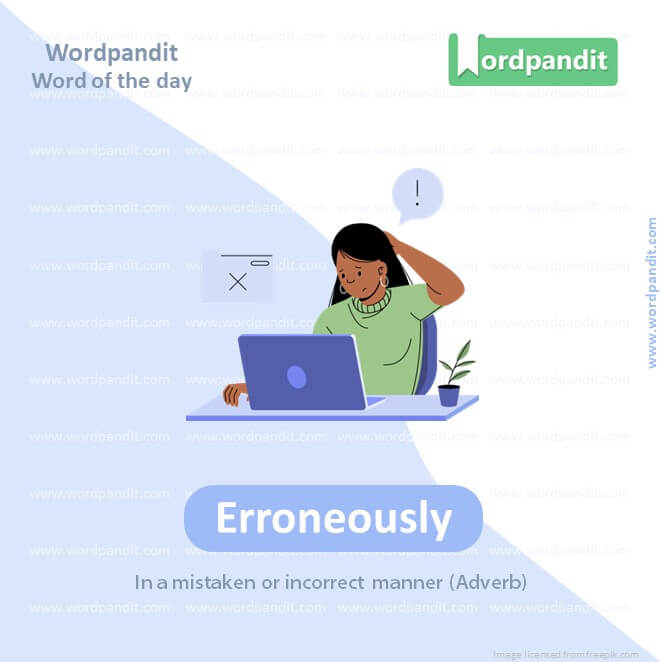
WORD-1: Erroneously
CONTEXT: Speaker Narwekar erroneously tries to determine which faction is the real Shiv Sena.
SOURCE: The Hindu
EXPLANATORY PARAGRAPH: Imagine you think a cat is a dog. That’s a mistake, right? When you think or say something that’s not true or correct, it’s called doing it “erroneously”. It’s like getting something wrong or mixed up.
MEANING: In a mistaken or incorrect manner (Adverb).
PRONUNCIATION: uh-ROW-nee-us-lee
SYNONYMS: Mistakenly, Incorrectly, Wrongly, Falsely, Inaccurately
USAGE EXAMPLES:
1. She erroneously believed that chocolate milk came from brown cows.
2. The address was erroneously entered into the GPS, leading them to the wrong location.
3. His name was erroneously omitted from the guest list.
4. The article was published with erroneously reported facts.
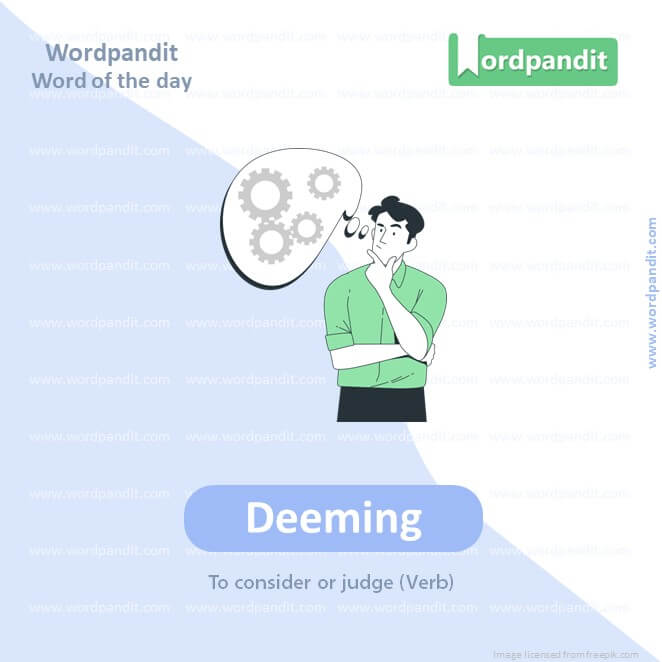
WORD-2: Deeming
CONTEXT: This deeming provision clarifies this question beyond any doubt.
SOURCE: The Hindu
EXPLANATORY PARAGRAPH: When you think about something and then decide what you believe about it, that’s “deeming”. Like when you look at a cloud and decide it looks like a bunny, you are deeming it looks like a bunny.
MEANING: To consider or judge (Verb).
PRONUNCIATION: DEEM-ing
SYNONYMS: Considering, Believing, Judging, Thinking, Assuming
USAGE EXAMPLES:
1. She deemed the movie appropriate for her younger brother.
2. The teacher deemed it necessary to postpone the test.
3. He was deemed the best player of the match.
4. They deemed the house safe after the inspection.
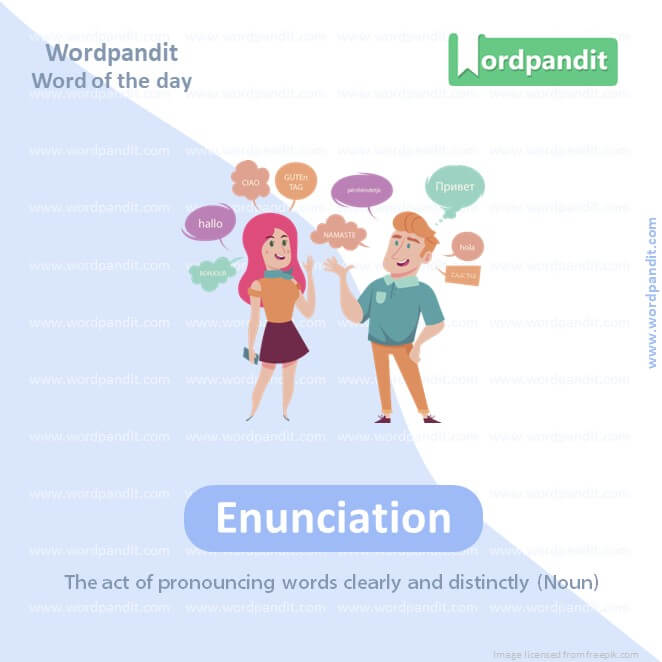
WORD-3: Enunciation
CONTEXT: In light of this clear enunciation of law by the Supreme Court, how could the Speaker come to a finding that the Shinde group is the real party? This decision of the Speaker is clearly without jurisdiction.
SOURCE: The Hindu
EXPLANATORY PARAGRAPH: Enunciation is when you speak so that every word is clear and easy to understand. It’s like when you say each part of a word carefully so others can hear you well.
MEANING: The act of pronouncing words clearly and distinctly (Noun).
PRONUNCIATION: en-un-see-AY-shun
SYNONYMS: Pronunciation, Articulation, Clarity, Diction, Elocution
USAGE EXAMPLES:
1. Good enunciation is important for a public speaker.
2. She practiced her enunciation before the speech.
3. His enunciation was so clear that everyone understood the difficult words.
4. Teachers often emphasize the importance of enunciation in language learning.
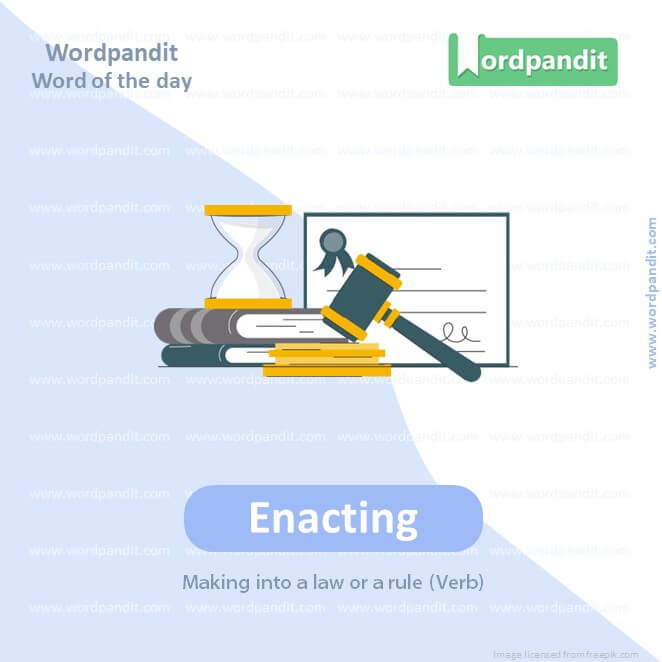
WORD-4: Enacting
CONTEXT: It may be noted that Parliament while enacting the Tenth Schedule did not consider paragraph 15 of the Symbols order as a relevant factor.
SOURCE: The Hindu
EXPLANATORY PARAGRAPH: Enacting is like when you make something become a rule or a law. It’s like saying, “This is what we must do,” and everyone agrees to follow it.
MEANING: Making into a law or a rule (Verb).
PRONUNCIATION: en-AKT-ing
SYNONYMS: Legislating, Passing, Establishing, Decreeing, Instituting
USAGE EXAMPLES:
1. The government is enacting a new law for environmental protection.
2. Enacting these policies will improve safety in schools.
3. The play involved enacting scenes from history.
4. They are enacting a ban on plastic bags in the city.
WORD-5: Conceptualisation
CONTEXT: the project, with its long water tunnels, aqueducts, underground surge pools, and large pumps, has been synonymous with controversy from the stage of conceptualisation.
SOURCE: The Hindu
EXPLANATORY PARAGRAPH: Conceptualisation is like when you get an idea in your mind about how something works or what it could be. It’s like imagining a new toy or a game in your head before it’s real.
MEANING: The process of forming a concept or idea (Noun).
PRONUNCIATION: kon-sep-chew-al-ih-ZAY-shun
SYNONYMS: Ideation, Conception, Visualization, Formulation, Imagining
USAGE EXAMPLES:
1. Her conceptualisation of the new device impressed everyone.
2. Conceptualisation is the first step in creative writing.
3. The architect’s conceptualisation of the building was innovative.
4. The conceptualisation of the project took several weeks.
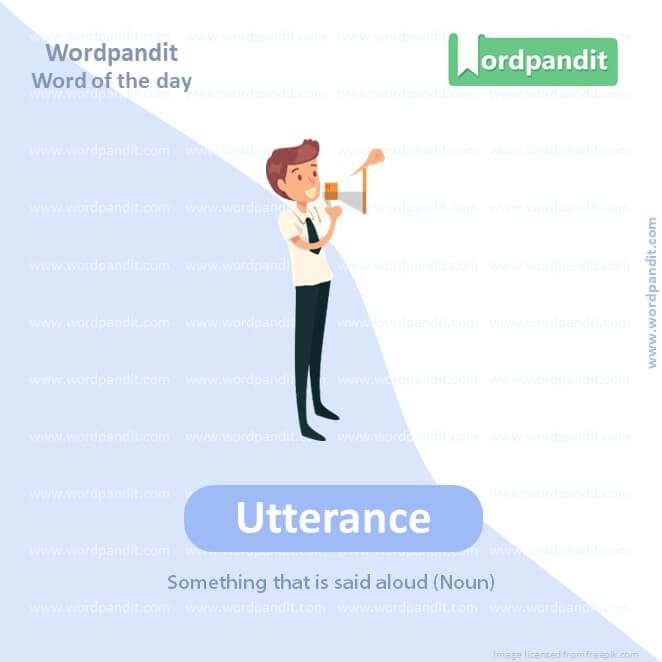
WORD-6: Utterance
CONTEXT: the voiced utterance in many Muslim forums and discussions that this must be the last of such disputes, and second, this case must not be a precedent for other mosques which are under the scanner of some political organisations for whom mandir-masjid disputes are a handy tool.
SOURCE: The Hindu
EXPLANATORY PARAGRAPH: Utterance is just a fancy word for something you say. It can be a word, a sentence, or even a sound you make when you talk.
MEANING: Something that is said aloud (Noun).
PRONUNCIATION: UT-ter-ance
SYNONYMS: Statement, Remark, Comment, Pronouncement, Expression
USAGE EXAMPLES:
1. His first utterance in the morning is usually a yawn.
2. The teacher asked for an utterance of apology from the student.
3. Her utterance was so quiet, it was barely heard.
4. Every utterance he made was carefully listened to by the audience.
WORD-7: Primordial
CONTEXT: the primordial interest of the nation that this dispute ends without more damage.
SOURCE: The Hindu
EXPLANATORY PARAGRAPH: Primordial is like talking about something really, really old, from the very beginning of time. Think of dinosaurs or the first plants on Earth. That’s primordial!
MEANING: Existing from the beginning of time; very ancient (Adjective).
PRONUNCIATION: pri-MOR-dee-al
SYNONYMS: Ancient, Prehistoric, Original, Primitive, Early
USAGE EXAMPLES:
1. The forest had a primordial beauty, untouched by humans.
2. He studied primordial cultures to understand human history.
3. The primordial soup theory explains the origin of life on Earth.
4. There was a primordial feel to the old cave paintings.
WORD-8: Shredding
CONTEXT: This was formulated to prevent such disputes from shredding this country.
SOURCE: The Hindu
EXPLANATORY PARAGRAPH: Shredding is like tearing something into tiny pieces. Imagine taking a piece of paper and ripping it up into lots of little strips. That’s shredding!
MEANING: Cutting or tearing into small, thin pieces (Verb).
PRONUNCIATION: SHRED-ding
SYNONYMS: Tearing, Ripping, Slicing, Chopping, Dicing
USAGE EXAMPLES:
1. She was shredding old documents for security.
2. Shredding the lettuce makes it easier to eat in a salad.
3. He enjoyed shredding on his guitar during the concert.
4. The machine is used for shredding plastic bottles.
WORD-9: Generous
CONTEXT: Two very generous donations of land near the disputed site in Ayodhya to set up an institute for communal harmony were noted.
SOURCE: The Hindu
EXPLANATORY PARAGRAPH: Generous means being really kind and giving lots of what you have to others. Like sharing your toys or giving someone a big piece of your cake. That’s being generous!
MEANING: Willing to give more of something, especially money or time, than is usual or expected (Adjective).
PRONUNCIATION: JEN-er-us
SYNONYMS: Kind, Giving, Charitable, Benevolent, Unselfish
USAGE EXAMPLES:
1. The generous man donated money to the orphanage.
2. She was known for her generous spirit, always helping others.
3. He made a generous offer to fund the school’s new library.
4. Her generous portion of cake made everyone smile.
WORD-10: Encroachment
CONTEXT: the Basic Structure of the Constitution, thus inhabiting a galaxy free from encroachment by a majoritarian Parliament.
SOURCE: The Hindu
EXPLANATORY PARAGRAPH: Encroachment is like when someone or something slowly starts to take over a space that isn’t theirs. Imagine your friend starts to use more and more of your desk space at school; that’s like encroachment.
MEANING: The act of gradually taking over someone else’s land, rights, or privileges (Noun).
PRONUNCIATION: en-KROACH-ment
SYNONYMS: Intrusion, Invasion, Trespass, Infringement, Incursion
USAGE EXAMPLES:
1. The neighbors were upset about the encroachment of the new building onto their property.
2. Wildlife faces threats from urban encroachment into their habitats.
3. The encroachment of digital technology into our daily lives is noticeable.
4. He was warned against the encroachment on company time for personal activities.
Vocabulary English
In the fascinating journey of language exploration, ‘vocabulary English’ stands as a powerful pillar. It represents the diverse array of words that bring thoughts and emotions to life. However, to unlock the full potential of ‘vocabulary English’, it’s necessary to adopt a comprehensive and strategic approach.
Understanding ‘vocabulary English’ goes beyond the mere repetition of words. It demands an intricate weave of understanding, memorization, and application. To grasp the essence of the ‘vocabulary English’, diversify your language resources. Engage with novels, biographies, news articles, and digital content to introduce yourself to words in real-world contexts.
A key to mastering ‘vocabulary English’ involves leveraging effective memory techniques. Use flashcards and digital apps that support active recall and spaced repetition. Mnemonic devices can also be beneficial. Establishing personal, visual, or narrative connections to words foster better recall and understanding.
Consistent exposure to ‘vocabulary English’ greatly enhances learning. Create dedicated time slots for regular vocabulary practice. This method not only consolidates learnt vocabulary but also introduces new words on a daily basis, ensuring a balanced and continuous learning process.
Practice holds the power to transform your ‘vocabulary English’ learning experience. Application of learnt words in daily conversations, professional communication, or digital platforms embeds them deeper into your long-term memory.
In essence, embracing ‘vocabulary English’ is a marathon, not a sprint. It requires immersion in various resources, using memory-enhancement techniques, continuous exposure, and above all, incessant practice. As you navigate this path, you’ll watch your ‘vocabulary English’ grow, raising your language proficiency and connectivity with the English-speaking world. It’s a fascinating journey that opens doors to different cultures, experiences, and opportunities. So, step forth, embrace ‘vocabulary English’, and let the journey begin!













